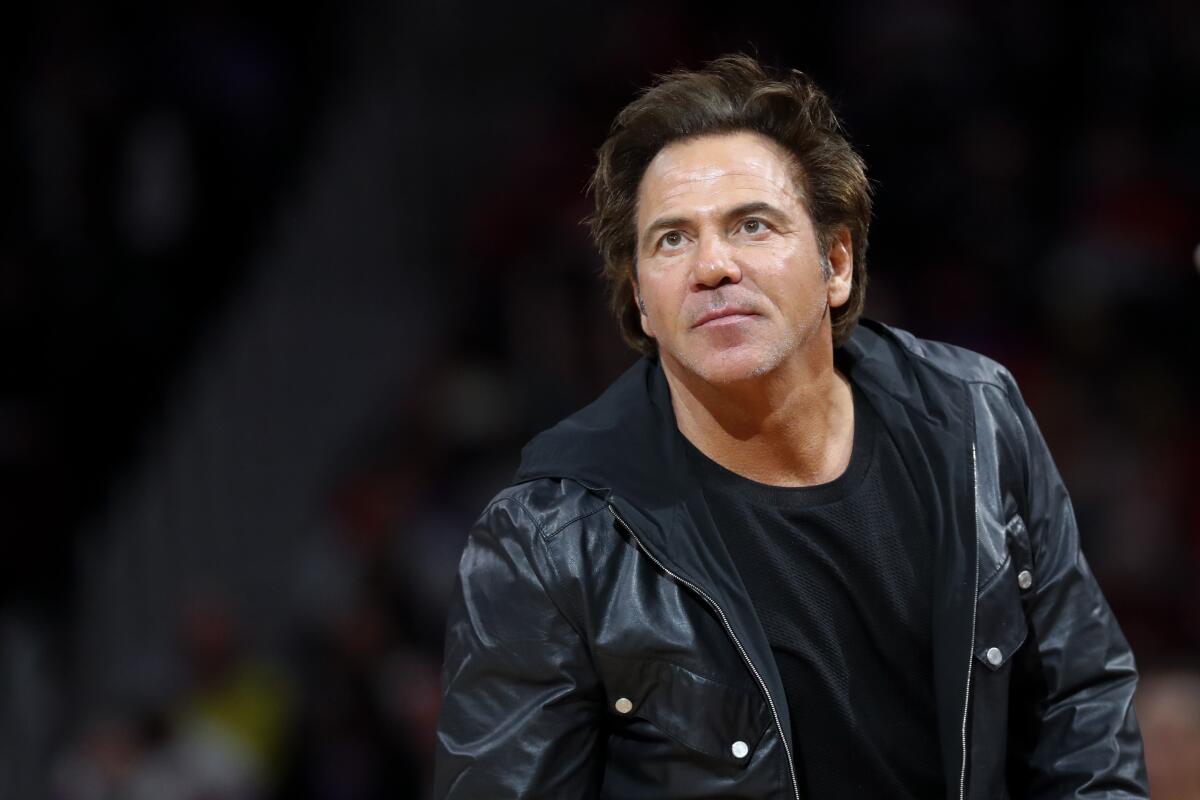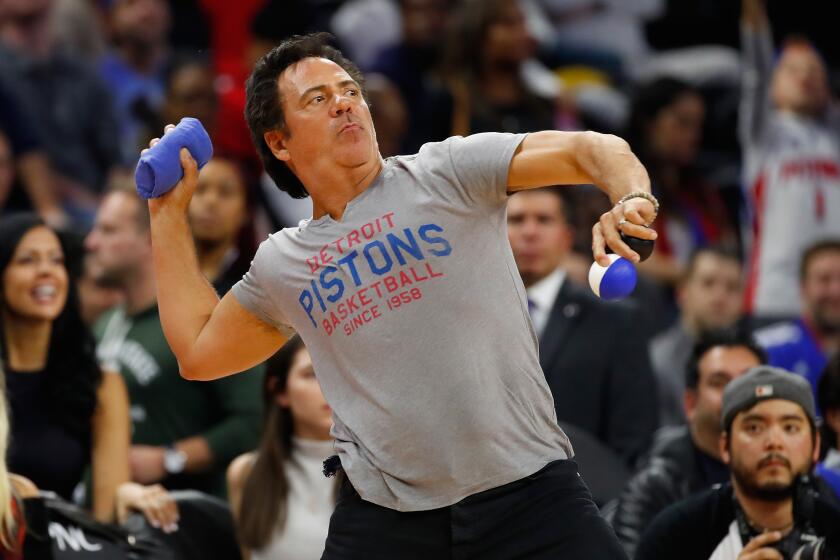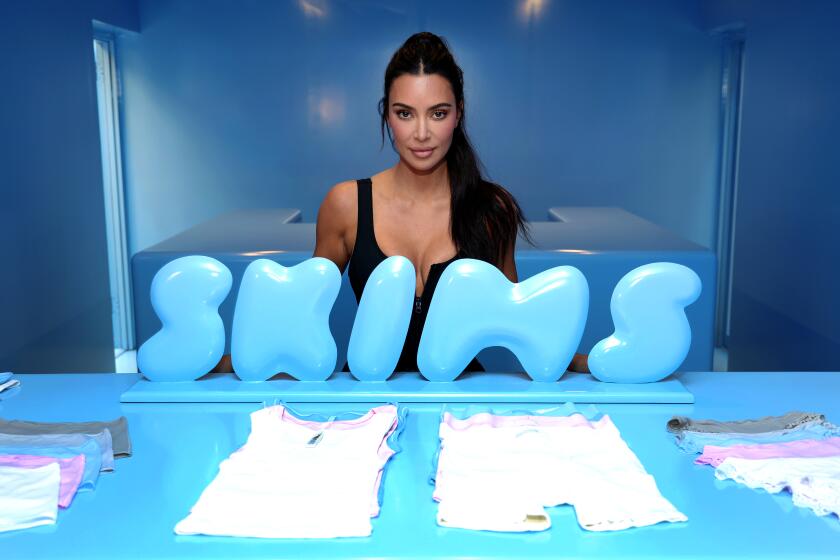Activists urge NBA to oust Pistons owner Tom Gores over prison phones investment

An activist group is pressuring the NBA to oust Detroit Pistons owner Tom Gores unless his private equity firm divests itself of a prison telephone company.
Amid a growing national referendum on criminal justice reform, Gores stepped down from the board of the Los Angeles County Museum of Art two months ago over the deal, and now the Los Angeles billionaire finds himself under fire again.
Worth Rises, a New York nonprofit, made the demands in a letter sent Dec. 10 to NBA Commissioner Adam Silver and the league’s board of governors, contending Gores has failed to live up to pledges to lower the rates charged by Securus Technologies.
It accuses the suburban Dallas telecom of “price-gouging families — that are disproportionately Black, brown, and low-income — as they struggle to keep in touch with their incarcerated loved ones,” and cites the league’s commitment to the Black Lives Matter movement.
“Put simply, he is a prison profiteer who has no place on the board of one of our nation’s favorite cultural institutions: the NBA,” the letter reads. “The NBA cannot allow Mr. Gores to whitewash his active exploitation of marginalized communities by simply asserting that Black Lives Matter.”
In response, Mark Barnhill, a partner at Gores’ firm Platinum Equity and an alternate on the NBA’s board of governors, said in an email statement that the company is “collaborating with a broad coalition of groups and individuals on the sweeping transformation of Securus Technologies.
“Our commitment to the community and to social justice is visible every day in impactful programs in Detroit supporting education, economic development, community involvement, civic and voter engagement, athletics and philanthropy,” the statement said.
Worth Rises founder Bianca Tylek said she received an email response from league officials encouraging her to take her concerns to Gores and Barnhill. She said she emailed the league back that her group had already done that over nearly two years of discussions with Platinum Equity.
“We have exhausted that channel. We are not going anywhere,” said Tylek, a Harvard Law School graduate and former Wall Street analyst.
NBA spokesman Mike Bass said in a statement that league officials understand “Worth Rises’ passion for prison reform and have been in regular communication with Tom Gores regarding their concerns. Mr. Gores and his colleagues have had ongoing discussions with a number of nonprofit organizations focused on similar reform and we support their efforts to address these important issues.”
The campaign against Gores began not long after his Beverly Hills private equity firm acquired Securus for $1.6 billion in 2017. Last year, activists called on him to lower rates and sell the telecom, lobbying public pension funds to not invest in the latest buyout fund by Platinum Equity.
In the face of the criticism, the firm still raised $10 billion, its biggest fund yet. Activists had more success this fall when they demanded Gores step down from the Los Angeles County Museum of Art, where he had been a trustee since 2006. More than 200 members of the Los Angeles arts community signed on to the effort, which was spurred by Worth Rises and Color of Change, another activist group that did not sign on to the NBA letter.
Gores has characterized himself as a “change agent,” defending his ownership to the museum board during a meeting in which he talked about his efforts to lower rates and reform Securus. But Gores ultimately stepped down from the board in October, saying in his resignation letter he did not realize the investment would become a “nexus for addressing the political, social, racial and economic issues roiling America today.” The letter also said he was returning his personal profits from the investment into reforming Securus.
Detroit Pistons owner Tom Gores became one of L.A.’s richest men snatching up imperiled companies and offloading them for profit. A prison phone operator, though, has brought him only problems.
Platinum Equity, which specializes in turning around troubled companies, announced in January that it had replaced management at Securus and pledged a series of reforms, including broader “rate relief.” The company, which had been accused of charging nearly $25 for a 15-minute call at a handful of jails, said this fall amid the museum controversy that it had brought the average cost of a call to less than 15 cents a minute and renegotiated 58 contracts that had rates that “previously exceeded national averages,” lowering them in some cases by 60% or more.
Worth Rises is not satisfied with the pace of reductions, contending in its news release Sunday that Securus still “routinely” charges as much as $15 for a 15-minute phone call. A large share of such charges is often returned to corrections agencies to help fund their departments in the form of commissions, a regressive tax that activists call a kickback. Last year, the group successfully lobbied New York to become the first major city to offer free phone calls in jails. This year, San Francisco became the first county in the nation to offer free phone calls.
The debate over prison telephone companies comes as criminal justice reform has found broad purchase, with newly elected Los Angeles County Dist. Atty. George Gascón announcing on his first day in office that he would eliminate the use of cash bail. Criminal justice activists want for-profit companies out of the system, including private prison operators and service providers, such as Securus.
Gores has said he will not sell Securus until Platinum is finished with its changes at the company, which involve advancing its communications technology. A forced sale could also lower the price any buyer might be willing to pay for the company, now a subsidiary of Aventiv Technologies after a corporate reorganization. It would appear that Gores would be even less likely to want to part with the Pistons, whom he rooted for growing up in nearby Flint, Mich.
Gores acquired a controlling stake in the team and its suburban arena in 2011 for $325 million and bought out the remaining 49% stake in 2015. At the time, Forbes valued the franchise at $810 million. This year, Forbes said the Pistons, who play in a new downtown arena, were worth $1.45 billion.
Sports franchise owners have been forced to unload teams, but that typically has involved financial troubles or questionable personal behavior, such as the racist remarks made by former L.A. Clippers owner Donald Sterling and former Cincinnati Reds owner Marge Schott. NBA bylaws allow the league to revoke a team’s ownership under certain conditions by a three-fourths vote of owners.
David Carter, a sports business consultant and professor at the USC Marshall School of Business, said leagues consider both objective metrics, such as financials, as well as subjective “intangible considerations” when weighing such controversies.
“Some [subjective] things certainly rise to the level of being untenable, maybe Marge Schott with the Cincinnati Reds and Donald Sterling with the Clippers,” he said. “Certainly there is a tremendous amount of sensitivity right now regarding social justice, and the NBA is very concerned and always has been about its brand and staying true to what it represents, but I don’t think it’s necessarily that crystal clear.”
Carter expects the league and its owners to move cautiously, given how some owners might be wondering if their own business interests could stand up to scrutiny.
“Are you concerned now about Big Tech? Are you worried about Big Pharma? Do you get concerned about the oil and gas industries as opposed to clean tech and solar? I think some owners would view it as a very slippery slope, and therefore I think they would be reticent to rapidly want to wrap their arms around this,” he said.
Gores, worth an estimated $5.7 billion by Forbes, has forged a reputation as a progressive owner who is close with his players and gives back to the Detroit community even while he lives in Southern California, where in 2017 he bought a home in the exclusive Beverly Park neighborhood of Los Angeles for $38 million.
He led a campaign that raised $10 million for Flint amid his hometown’s water crisis, was lauded for returning the Pistons to Detroit from the suburbs and was one of the few professional sports team owners to support his players kneeling amid the Colin Kaepernick controversy. He also allowed his team’s new practice facility to serve as a polling place this year.
George Floyd’s death while in Minneapolis police custody this summer reinvigorated the Black Lives Matter movement and heightened sensitivities about racial injustice. When the NBA resumed play July 30 after a hiatus for COVID-19, “Black Lives Matter” was emblazoned in huge black letters across the court where games were played in the bubble, and on players’ jerseys.
In August, NBA players spontaneously refused to play games for two days in protest of the police shooting of Jacob Blake in Kenosha, Wis. NBA owners also agreed to collectively contribute $30 million annually for a decade to fund a new NBA foundation with a mission “to drive economic empowerment for Black communities through employment and career-advancement” — which was noted by Worth Rises in its letter.
To heighten awareness of its campaign, which comes days before the league starts its new season, the group took out a full-page ad in the sports section of the New York Times on Sunday that names league owners, asking them, “If Black Lives Matter, what are you doing about Detroit Pistons owner Tom Gores?”








